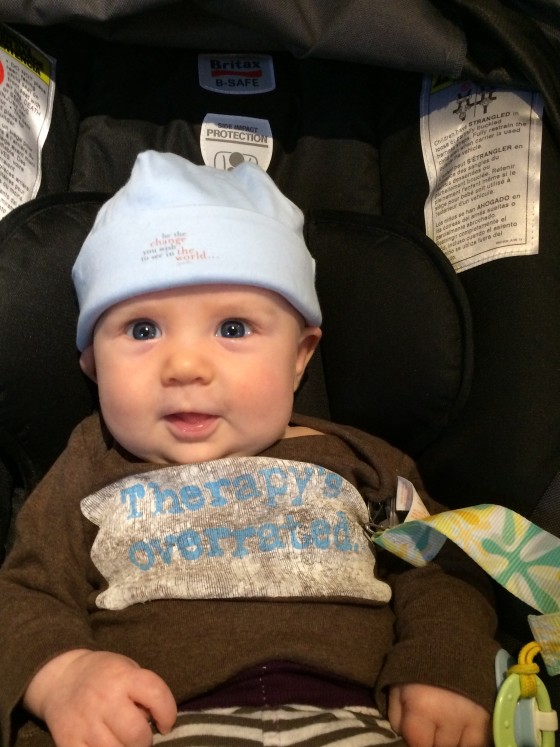Remembering Resilience
Several months ago I posted an article on my Facebook wall critiquing the current use of "resilience." As the author argued,
Resilience is fleet, adaptive, pragmatic — and it has become an obsession among middle-class parents who want to prepare their children to withstand a world that won’t always go their way...But where ‘‘resilience’’ can suggest new avenues for civic infrastructure — admitting that disaster can’t always be diverted and shifting the focus to survival strategies — it is indistinguishable from classic American bootstrap logic when it is applied to individuals, placing all the burden of success and failure on a person’s character.
I appreciate the attention in this article to the ways in which our hyper-individualistic culture can co-opt an otherwise useful concept, thereby making it an empty and even harmful tool. However, fours months into parenthood and as a therapist who frequently works with people who have suffered significant trauma in their lives, I would like to take a stab at reclaiming resilience.
To start with the personal, I recently received the hospital records from the cesarean birth of my child. As I leafed through the document and read how much my daughter struggled during her first few minutes in this world, fear overtook me. I immediately lost sight of the smiling, calm baby before me and convinced myself that she was doomed to some sort of long-term suffering from her traumatic birth. Instead of focusing on the healing work we had done with a craniosacral therapist in the weeks following her birth and, perhaps more importantly, the fact that her inconsolable crying spells had abated, I momentarily convinced myself that my child had been irreparably harmed. Thankfully, my partner and I know a skillful healer who has long specialized in trauma, and we reached out to him. He stopped my lizard brain in its tracks by asking some important questions--namely, what evidence do you have, in the here and now, that she is struggling with birth trauma?

I did not have evidence; I had fear stories. Coming back into the present and my body, I realized I could attune to my child and respond to signs of trouble, should they appear, in the present or down the road. But I did not need to create a problem for my child out of my own traumatic memory and experience. Instead, I could and did remember a very poignant line from Carl Jung-- “The greatest tragedy of the family is the unlived lives of the parents.” I've been attending to my own healing from the birth ever since.
Fast forward a few months to my return to work, and clients neglect of their own resilience smacked me in the face. One client in particular reminded me just how limited and limiting our worlds become when we focus only on the negative experiences we have had and ignore the parts of ourselves that allowed us to persevere through them. Before me sat an incredibly insightful, funny, kind human being who wanted me to focus on all the diagnoses they had been given through their many years of meeting with various psychotherapists and psychiatrists. Yes, they had suffered repeated and terrible trauma. And yes that trauma had significantly and adversely impacted their life. But they were so caught up in the tagline of being multiple disorders that they could not see their strengths or the many survival resources they had drawn upon to make it into my office, let alone middle age. Only once we had cut through the story of deficiency and defectiveness could they re-member (literally come back into their body as a whole self) their vitality. They could then reconnect with their desire not only to survive but also to flourish and have that aspiration guide their actions.
I do not want to minimize the harms that we as human beings wreak on each other, the Earth, and ourselves. But I also do not want to forget that, to borrow from Taoist Chuang Tzu, 10,000 joys accompany the 10,000 sorrows of life. The miracle and beauty of human beings is that we have the capacity to hold all of life, including its less savory parts. What is more, with appropriate and adequate support--not "American bootstrap logic"--we can use the tough stuff as fodder for wisdom, compassion, and love for the life that is here.
Research also shows that how we frame difficult experiences can matter a lot. As Maria Konnikova recently wrote,
Human beings are capable of worry and rumination: we can take a minor thing, blow it up in our heads, run through it over and over, and drive ourselves crazy until we feel like that minor thing is the biggest thing that ever happened. In a sense, it’s a self-fulfilling prophecy. Frame adversity as a challenge, and you become more flexible and able to deal with it, move on, learn from it, and grow. Focus on it, frame it as a threat, and a potentially traumatic event becomes an enduring problem; you become more inflexible, and more likely to be negatively affected.
May we all learn to grow from the difficult experiences of our lives so that they ultimately enrich rather than diminish us.